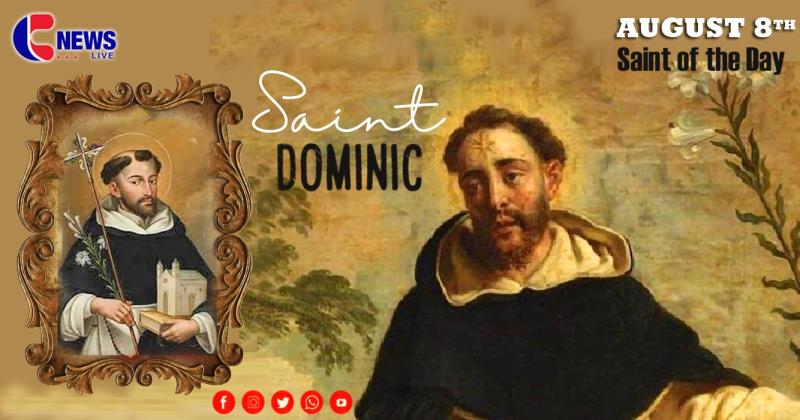Saint Dominic Founding the Dominican Order & Patron of Astronomers
Elias Bejjani/August 08/2025
Full Name: Dominic de Guzmán
Born: circa 1170, Caleruega, Castile (modern-day Spain)
Died: August 6, 1221, Bologna, Italy
Canonized: July 13, 1234, by Pope Gregory IX
Feast Day: August 8 (formerly August 4 in some calendars)
Patron of: Astronomers, the Dominican Republic, scientists, and educators
Early Life and Education
Saint Dominic was born into a noble family. His father, Félix de Guzmán, was a respected nobleman, and his mother, Blessed Joan of Aza, was renowned for her piety and charity. According to tradition, she had a prophetic dream before his birth of a dog leaping from her womb holding a torch in its mouth, which would “set the world on fire” — a symbol later interpreted as Dominic’s preaching mission.
Dominic received a classical education in Palencia, one of the oldest universities in Spain. He studied liberal arts and theology, and distinguished himself for both academic brilliance and deep spirituality. During a time of great famine in Spain, he sold his precious books to feed the poor, saying, “Would you have me study from these dead skins while people are dying of hunger?”
Priesthood and Early Ministry
In 1196, Dominic joined the cathedral chapter of Osma and was ordained a priest. He accompanied Bishop Diego de Acebo on diplomatic and missionary journeys, including a critical trip through southern France in 1206. There, they encountered the growing heretical movement of the Albigensians (also called Cathars), who rejected Catholic sacraments, the physical world, and Church authority.
Dominic was profoundly moved by the spiritual ignorance and error he saw. Rather than using force to convert heretics — as was becoming common — Dominic believed in conversion through persuasion, preaching, and personal example. He adopted a lifestyle of radical poverty and simplicity, mirroring the Apostles, to better reach the common people.
Founding the Dominican Order
In 1215, while in Toulouse, Dominic gathered a group of men committed to preaching and living simply in imitation of Christ. He traveled to Rome in 1216 to seek papal approval for his community. On December 22, 1216, Pope Honorius III officially approved the Order of Preachers (Ordo Praedicatorum), now commonly known as the Dominicans.
Key Features of the Dominican Order:
Purpose: Combat heresy through sound preaching and theology.
Lifestyle: A blend of monastic discipline, academic study, and active preaching.
Vows: Poverty, chastity, and obedience.
Motto: Veritas (Latin for “Truth”).
Dominic emphasized education. Dominicans were trained in philosophy and theology at major universities like Paris and Bologna. This academic focus enabled the order to counter heretical teachings intellectually and spiritually.
Mission and Legacy
Dominic spent the remainder of his life organizing the new order, founding convents and sending missionaries across Europe. He tirelessly preached in France, Spain, and Italy. He was known for:
His compassion and humility.
A deep devotion to prayer, often spending nights in contemplation.
Miracles, including healings and prophecies (documented by early hagiographers).
Spreading devotion to the Rosary — tradition holds that the Blessed Virgin Mary gave Dominic the Rosary as a spiritual weapon against heresy. While the historical roots are complex, this tradition had a lasting impact.
He died on August 6, 1221, in Bologna, Italy, worn out from travel and work, surrounded by his brothers. He was canonized only 13 years later, a testament to his sanctity and widespread veneration.
Influence and the Dominican Legacy
Saint Dominic’s foundation left a profound and lasting mark on the Church. Among the most notable Dominicans:
Saint Thomas Aquinas – a towering figure in Catholic theology.
Saint Catherine of Siena – mystic, reformer, and Doctor of the Church.
Bartolomé de las Casas – advocate for Indigenous peoples of the Americas.
Dominican friars played crucial roles in:
The medieval university system
The Inquisition (though this came later and is a complex part of their history)
Global missionary work
The intellectual defense of the faith through the centuries
Today, Dominicans serve worldwide in preaching, education, and pastoral ministry.
Spiritual Legacy
Saint Dominic remains a model of:
Evangelical zeal
Intellectual integrity
Apostolic poverty
Devotion to truth and to Mary
His motto, “Speak only to God or about God,” reflects his singular focus on the salvation of souls and the glory of God.

















